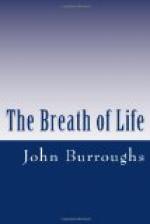Sir Oliver Lodge is apparently so impressed with some such considerations that he spiritualizes life, and makes it some mysterious entity in itself, existing apart from the matter which it animates and uses; not a source of energy but a timer and releaser of energy. Henri Bergson, in his “Creative Evolution,” expounds a similar philosophy of life. Life is a current in opposition to matter which it enters into, and organizes into the myriads of living forms.
I confess that it is easier for me to think of life in these terms than in terms of physical science. The view falls in better with our anthropomorphic tendencies. It appeals to the imagination and to our myth-making aptitudes. It gives a dramatic interest to the question. With Bergson we see life struggling with matter, seeking to overcome its obduracy, compromising with it, taking a half-loaf when it cannot get a whole one; we see evolution as the unfolding of a vast drama acted upon the stage of geologic time. Creation becomes a perpetual process, the creative energy an ever-present and familiar fact. Bergson’s book is a wonderful addition to the literature of science and of philosophy. The poet, the dreamer, the mystic, in each of us takes heart at Bergson’s beautiful philosophy; it seems like a part of life; it goes so well with living things. As James said, it is like the light of the morning and the singing of birds; we glory in seeing the intellect humbled as he humbles it. The concepts of science try our mettle. They do not appeal to our humanity, or to our myth-making tendencies; they appeal to the purely intellectual, impersonal force within us. Though all our gods totter and fall, science goes its way; though our hearts are chilled and our lives are orphaned, science cannot turn aside, or veil its light. It does not temper the wind to the shorn lamb.
Hence the scientific conception of the universe repels many people. They are not equal to it. To think of life as involved in the very constitution of matter itself is a much harder proposition than to conceive of it as Bergson and Sir Oliver Lodge do, as an independent reality. The latter view gives the mind something more tangible to lay hold of. Indeed, science gives the mind nothing to take hold of. Does any chemical process give the mind any separate reality to take hold of? Is there a spirit of fire, or of decay, or of disease, or of health?
IX
Behold a man with his wonderful body, and still more wonderful mind; try to think of him as being fathered and mothered by the mere mechanical and chemical forces that we see at work in the rocks and soil underfoot, begotten by chemical affinity or the solar energy working as molecular physic, and mothered by the warmth and moisture, by osmosis and the colloid state—and all through the chance clashings and groupings of the irrational physical forces. Nothing is added to them, nothing guides or inspires them, nothing moves




